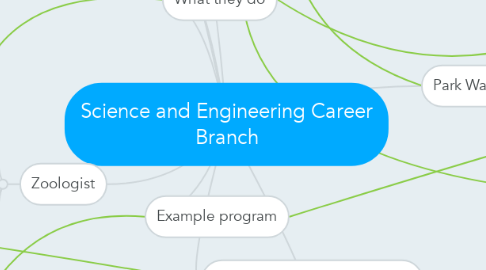
1. What they do
2. Zoologist
2.1. Zoologists study animals. They also teach, conduct researches, and inform the public about endangered species.
2.1.1. Zoologists work on their own schedule most of the time. They usually work in the field, studying animals in their natural habitat, or in a university teaching students as a professor. The challenges they face are finding a job. There are limited jobs available, which means it might be hard to find a job working for someone else, but the government is always investing.
2.1.1.1. The salaries that people make range from $30,000 to more than $140,000 a year. The average is approximately $65,000 a year.
2.2. As they gain more experience and seniority their pay continues to grow and grow because as you gain experience you can conduct more efficient researches. As you get more experience the amount you get paid tends to grow a lot.
2.2.1. The experience is not required but the more you have the definitely better chance you have. A great factor in getting accepted over another person with even marks higher than you would be experience. Co-op is probably the best thing you can do to help you get accepted.
2.2.1.1. The future outlook on this career is outstanding. The current trends are proof that the government cares and is investing very, very large amounts of money into this career area. A potential barrier I see is if a government is in control of Canada is against investing into protecting the environment, I hope it doesn’t happen but it is definitely a possibility.
2.3. A program I could take would be a co-op at Guelph University. The program is 4 years. The credentials are high 70s and low 80s at least in university level sciences, math, English, and two other university level courses.
3. Work Conditions
4. Salaries
5. Job seniority and responsibility
6. Example program
7. Institutions and requirements
8. Job Market and possible Barriers.
9. Park Warden / Ranger
9.1. A park warden / ranger looks after Canada's provincial or national parks to protect the park, the animals, and the people.
9.1.1. As you gain more experience you go from being part time, full time, chief assistant, or chief park wardens and rangers.
9.1.1.1. A program would be at a university in natural sciences, or a related field to become a park warden. To become a park ranger a college diploma in renewable resource management or a similar subject.
9.2. The working conditions are a 40 hour work week with sometimes being on call. They work at either provincial or national parks. A challenge they may face is that if they don’t live close they can’t be on call or protect it every day. It’s not high risk because once you are there they aren’t likely going to fire you.
9.2.1. University of Manitoba – no requirements on website Natural resources degree University of Guelph natural resources degree, no requirements. No co-op required, no volunteer required. I don’t believe there is any.
9.2.1.1. The trends in this job market look good. National and provincial parks are being made all over the world as people come to realize that we need to protect the life on earth. Limited in picking a job if you ever wanted to change a potential barrier I see about selecting this program is there is not really any other job that has to do with natural resources so you would be very tough to change if you don’t like it.

